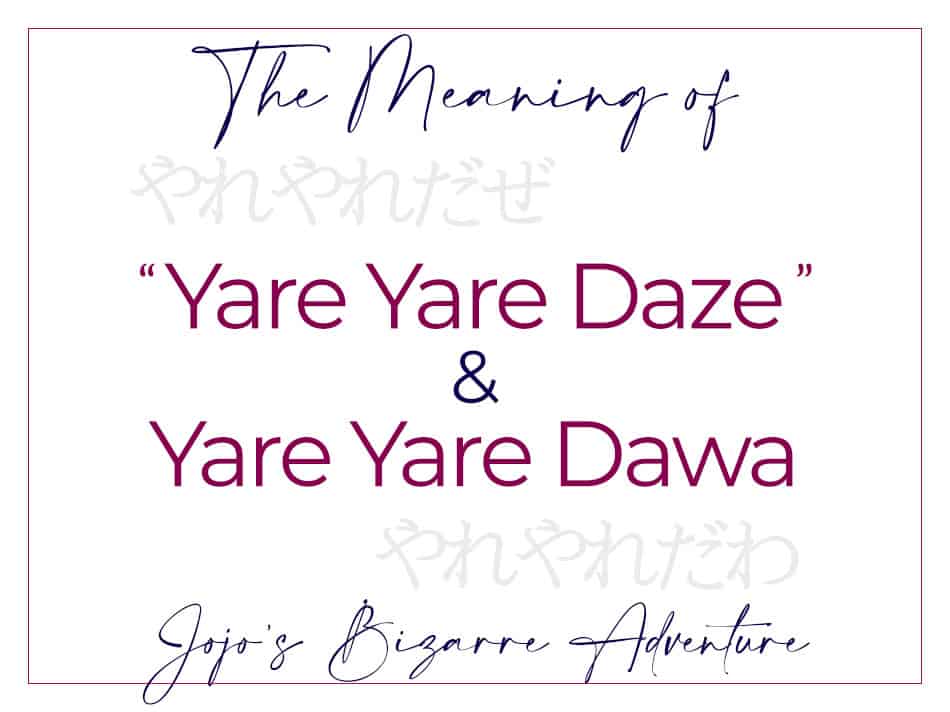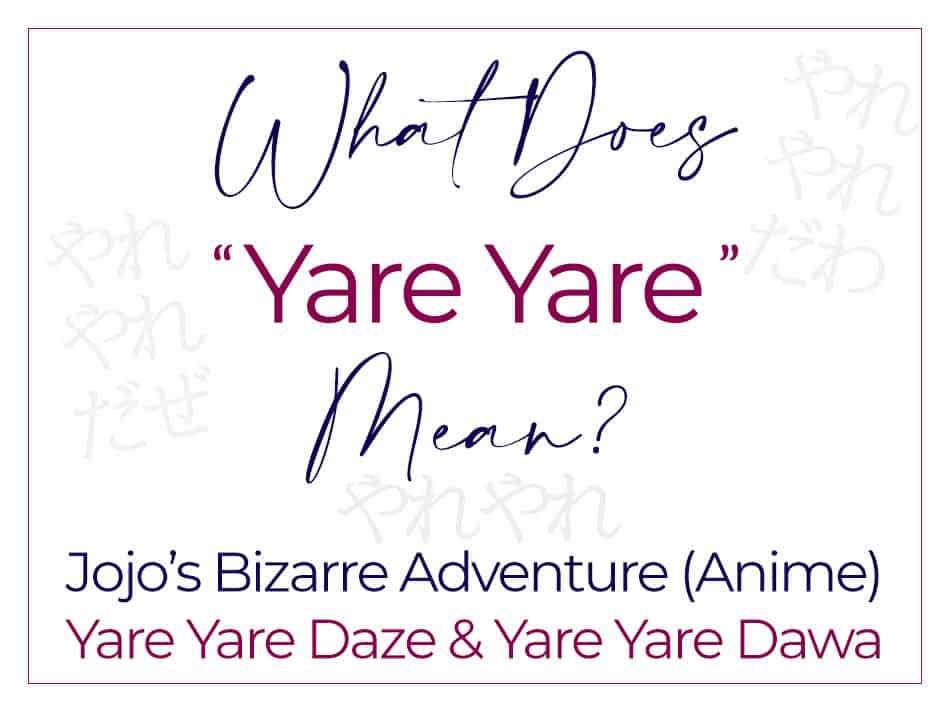“Yare yare” is a Japanese phrase that you will often hear in anime – especially if you are a fan of Jojo’s Bizarre Adventure. While the different English translations I have seen online and in anime are good, they do not entirely clarify the meaning of the phrase. So I have decided to write this post and explain exactly what “Yare yare” means and how to translate it.
Yare yare (やれ やれ) is a Japanese interjection that is mainly used by men and means “Good grief”, “Give me a break”, or “Thank God”. Depending on the situation and the tone of voice it can express relief, annoyance, disappointment, pity or surprise. It is used in a similar way as “sigh” in English.
Since the phrase has such distinct translations I have put together a bunch of example sentences for you down below. Hopefully, they will help you understand how and when to use “Yare yare“. We will also take a look at what the slightly different catchphrases “Yare yare daze” and “Yare yare dawa” from the anime Jojo’s Bizarre Adventure mean.
What Does “Yare Yare” Mean in Japanese?
やれ (yare) is a Japanese word or exclamation that is typically only used by males and that can be translated as “oh“, “ah“, “oh dear“, “dear me“, or “thank god” (source). When used in real life as well as in anime, the word is usually repeated at least twice and turns into the common phrase やれやれ (yare yare).
Please note that the word やれ (yare) could actually also be the imperative form of the verb やる (yaru), which has a bunch of meanings including “to do” and “to kill” depending on how it is written. However, in my opinion, it is nearly impossible to confuse やれ (yare) with やれやれ (yare yare). So don’t worry about it!
The interjection やれやれ (yare yare) is used in all kinds of situations to express a variety of feelings and emotions such as relief, annoyance, disappointment, and pity for someone else. So depending on what’s going on and the speaker’s tone of voice there are a couple of suitable translations. Some of the most common ones are:
- Good grief!
- Give me a break!
- What a pain!
- Thank God!
- Geez!
Another good way to think of やれやれ (yare yare) is *sigh*. It is not an onomatopoeia and therefore not associated with the sound of sighing. But *sigh* can also be used in all kinds of situations and expresses relief, annoyance, and so on. やれやれ (yare yare) is used in exactly the same way.
Using the interjection in real life is not really common but you might find someone saying it. When it is used it will most likely be an adult or slightly older men. I have never heard a teenager say やれやれ (yare yare).
1. Yare Yare Meaning Relief or Breathing a Sigh of Relief
Whenever you experience a feeling of relief or happiness after going through something stressful, unpleasant, or undesirable, or when you were able to avoid it completely, you can say やれやれ (yare yare).
In this situation, the phrase is best translated as “Thank God“, “Thank heavens“, “phew“, or something like “Whew! I made it” or “Finally it is over“. As you can see it doesn’t really sound like you are excited about it but rather extremely tired after finally being relieved from the burden, tension, or mental pressure.
| Yare yare, yatto tsuita yo ne. Thank God we are here at last. やれやれ、やっと着いたよね。 |
| Yare yare, shiken ga owatta. Phew! Finally, the exams are over. やれやれ試験が終わった。 |
| Yare yare, yokatta. Whew, what a relief. やれやれ、良かった。 |
You can also use the phrase やれやれと思う (yare yare to omou) which means “to feel relieved” or “to breathe a sigh of relief” in this kind of situation. The more casual form is やれやれって思う (yare yare tte omou).
2. Yare Yare Meaning Annoyance or Displeasure
やれやれ (yare yare) can also be used when you are fed up with something or when you face some kind of unexpected burden, problem, or nuisance. In this case the phrase expresses your annoyance, displeasure, or disappointment with the current situation or what’s coming up.
Please note that when the interjection is used to express annoyance it is not an aggressive way of venting one’s anger. It is more like showing feelings of dismay in a still calm and composed manner.
Good translations are “Geez“, “Jeez“, “Gosh“, “Damn“, “Oh man“, “Good grief“, “Not again“, “Give me a break” or “Gimme a break“. But it can also go all the way to “What the (hell)” or even “What a pain (in the…)“.
| Yare yare, mata ano gaki da! Gosh, it’s that brat again! やれやれ、またあのガキだ! |
| Mata zangyou ka? Yare yare… I have to work overtime again? Gimme a break… また残業か?やれやれ… |
| Yare yare, iya ni natte shimatta. What the hell! I’m so sick of this. やれやれ、いやになってしまった。 |
Together with expressing relief this is the most common situation when やれやれ (yare yare) is used. You can also think about it as rolling your eyes and/or shaking your head in dismay or disappointment. It is also often translated to the Yiddish phrase “Oh vey”.
3. Yare Yare Meaning Pity or Sympathy For Someone Else
You can also show sympathy or feelings of pity for someone else’s misfortune with this interjection. However, this meaning is less common than the ones we have just discussed. A few times I have heard it used in that sense in anime, but never in a real life situation. Probably because it does not express deep concern.
“Oh no“, “Well“, “Oh well“, “Well well“, or “What a pity” are some of the suitable English translations in this situation. As you can hopefully see from the translations it does not express a lot of sympathy.
| Yare yare, kawaisou ni… Oh no, poor thing… やれやれ、可哀想に。 |
| Yare yare, mata sono hanashi ka. Oh well, there you go again. やれやれ、またその話か。 |
| Yare yare, zannen desu yo ne. Well, what a pity. / Well, that’s too bad. やれやれ、残念ですよね。 |
In this situation the interjection’s meaning is very similar to あらあら (ara ara), which is another popular phrase used in anime and kinda like the female version of やれやれ (yare yare). However, in comparison あらあら (ara ara) sounds way more gentle and affectionate.
4. Yare Yare Meaning Mild Surprise or Astonishment
Last but not least, やれやれ (yare yare) is used to express one’s mild surprise or astonishment. In this situation you can think of it as “Oh“, “Ah“, “Oh, my“, or “Oh dear“.
| Yare yare kita ze?! Oh, you really came?! やれやれ、来たぜ。 |
| Yare yare… Oh, my… やれやれ… |
| Oo yare yare…. Oh dear… お〜 やれやれ… |
Here the translations really depend on the tone of voice. For example, the first example sentence could also be “Phew! Finally you came” if said with more enthusiasm or “Sigh! Finally you came!” if the person speaks in a slightly annoyed undertone.
When used like this it is again very similar to the more feminine interjection あらあら (ara ara) which means “My my”, “Oh dear”, or “Oh me, oh my” in English.
“Yare Yare Daze” and “Yare Yare Dawa” (Jojo’s Bizarre Adventure)

If you are into the anime Jojo’s Bizarre Adventure you will have heard the Japanese phrase “yare yare” a million times. Jotaro Kujo‘s catchphrase is “yare yare daze” and Jolyne Kujo‘s – his daughter’s – catchphrase is “yare yare dawa“. So what do the phrases mean and how are they different from “yare yare“?
The catchphrase’s “Yare yare daze” and “Yare yare dawa” in Jojo’s Bizarre Adventure have the same meaning as “yare yare (da)” and can be translated as “Gimme a break”, “What a pain”, or “Good grief”. Adding “ze” makes the phrase sound more masculine while adding “wa” makes it sound more feminine.
Adding だ (da) to やれやれ (yare yare) does not change its translation. It is more like adding an exclamation mark to it. So instead of “Gimme a break” it sounds a bit stronger “Gimme a break!“. In case you are interested in the grammar だ (da) is the informal version of the Japanese copula です (desu) and is used to make a declarative statement.
The ぜ (ze) after やれやれだ (yare yare da) is a sentence end particle that is usually only used by men. It adds force and makes the sentence sound more masculine.
わ (wa), on the other hand, is a sentence end particle that is usually only used by women. It makes sentences sound softer or more emotional and therefore more feminine. However, やれやれだ (yare yare da) is actually a rather masculine phrase and so it just adds a slight female touch to it.
- Yare yare (やれやれ) means “Gimme a break“
- Yare yare da (やれやれだ) is more casual “Gimme a break!“
- Yare yare daze (やれやれだぜ) sounds more masculine and intense
- Yare yare dawa (やれやれだわ) sounds slightly more feminine
So the catchphrases have exactly the same meanings as やれやれ (yare yare). The endings だぜ (daze) and だわ (dawa) only change the nuance and feeling of the sentence.
やれやれだぜ (yare yare daze) and やれやれだわ (yare yare dawa) are two variations that are only used in the anime. Well, maybe some Jojo otaku might use the phrase for fun in real life, but that is probably the only occasion that you will come across it.
That Japanese Man Yuta‘s video goes into more details:



I got what you mean , regards for posting .Woh I am pleased to find this website through google.
Hey Rigoberto,
I’m also glad that you found my website 😉
Let me know if you have any specific questions about Japanese.
Best,
Alex